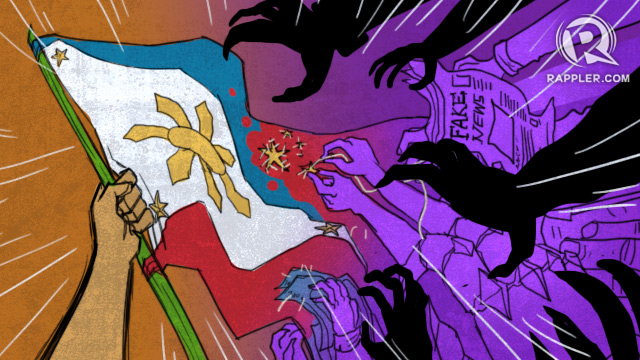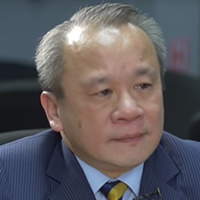

(These are excerpts from the speech delivered during the commencement exercise at the University of the Philippines Manila on Wednesday, June 26.)
These are not normal times. If these were normal times, you would not need a lawyer to speak to you about standing up for truth, justice, and human rights.
These are not normal times.
It is war time.
We are in a war that is being waged on many fronts and in many forms.
The war against life and due process continues with unabated and unaddressed extra-judicial killings.
The war against truth continues with lies, falsehoods, and fake news forming a part of the daily fabric of our lives.
The war against decency continues with the coarsening of public discourse and with foul language substituting for policy pronouncements.
The war against accountability continues with public institutions mandated to safeguard accountability disparaged, and assaulted.
The war against integrity continues with courageous civil servants who dare to speak up or speak out humiliated, silenced, and, in some instances, even removed.
Our sovereignty has been imperiled.
This war has claimed many casualties: the dead that have strewn our streets, the widowed and the orphaned, our very sense of self – who we are as a nation and as a people. This war has struck at the very sense of our regard for life, for dignity, for truth, and for justice, and has left many of us desensitized, even bereft of hope.
It is a war that is not of our choosing, yet it is a war that we are all called to wage.
Let me propose 4 ways to wage this war.
1. Remember always who we are. Remember always whose we are.
Iskolar ng Bayan. We come from the people.
That is our identity, our burden, our charge, our responsibility.
Iskolar ng Bayan, para kanino, para saan?
What do those degrees really mean?
We all probably have different answers to this question, but what I do know is this: your titles and degrees mean nothing if receiving them today is the end of it.
During my LLM year, I had a professor who would grade us by the questions we asked of him. This made me realize that it is perfectly acceptable to not know all the answers, but it is absolutely inexcusable to not ask questions. That professor, a sprightly 70-year-old with great intellectual curiosity and intense academic passions, made me realize that curiosity and passion are timeless values that spell the difference between a degree that simply hangs on a wall and one that is lived out fully.
So, be curious, courageous, and passionate. Ask questions, and be passionate and determined about finding answers. The “asking” leads to “acting,” and it is in the process of “asking and acting” that your degrees take on flesh and muscle, blood and bone. But “flesh and muscle, blood and bone” mean nothing if there is no soul, no spirit. If “asking and acting” are flesh and muscle, blood and bone, then “being good and finding ways to help” are soul and spirit.
The challenge to you is to continue asking and acting, confronting and challenging, being good and finding ways to help wherever you may find yourselves in.
Remember who you are. Remember whose you are.
Iskolar ng Bayan, Iskolar para sa Bayan.
2. Find ways to help.
There are many ways that UP Manila graduates can help, but in the interest of time, I will give just two.
First, UP Manila has one thing I wish the College of Law has – a “Return Service Agreement.” I wish all entering freshmen at the College of Law had a “Return Service Agreement” – to render free legal service before being allowed to take the bar. Your RSA is a concrete mechanism that allows you to help. And, in a time when the value of life is cheaper than the cost of the bullet it takes to snuff it out, we need all the help we can get. For those with RSAs, do not look at them as obligation or burden, or even as just a way to give back. Look at it as your way of loving our country, our people. And our country is direly in need of love, and one can never have too much love.
Second, we cannot continue working in silos – each doing their own thing, albeit expertly done. We must learn to work together.
As a lawyer, I have had the happy experience of working with experts from UP Manila, like Dr Raquel Fortun, who I met many years back while working on a case, and is now a favorite resource person and witness in cases involving EJKs. We saw how badly lawyers needed to learn about medicine and how badly doctors needed to understand lawyers. So, we came up with a radical idea to transform “Legal Medicine” as it was being taught in law school into “Law and Science,” marrying the law on evidence and the principles of forensic pathology to teach 3rd year law students the real “Legal Medicine.” She became UP Law’s first non-lawyer to teach a law class; I am still waiting for my opportunity to return the favor at the UP College of Medicine.
Many years ago – and they may not remember this – doctors from UP College of Medicine and the PGH helped us save a man from death row. His name was Marlon Parazo, a deaf-mute who, surprisingly, “spoke” during the trial. He was sentenced to death because the courts did not believe his testimony. Our challenge was to help the courts understand his condition. After many requests, the Supreme Court permitted him to be examined by experts from, where else, UP. And in short order, those experts – Dr Maria Luz Casimiro-Querubin, Ms Meredith Castro, Dr Grace Orteza, and now Dean Charlotte Chiong – confirmed what we, the lawyers, had known all along: he was deaf and mute with a mental age of 9 years old.
Law and science meet at an intersection where truth – unvarnished, objective, whole, and absolute –is found. Without science, law would be left where we are now, relying on unlearned opinion, speculating on causes based on human perception and, often, imagination.
When lives are taken and the truth about the taking is itself hijacked, law finds itself at a great difficulty because law operates on facts that can be proven, and without the use of science to find those facts, law becomes irrelevant. That is why in combatting impunity arising from unaddressed EJKs, law must partner with science to enhance its capacity to find the truth.
3. Be a counterculture.
UP teaches us not merely to be experts at our chosen field of study but to also be principled and passionate advocates for genuine and meaningful change; to not only be solid scientists but to also be critical thinkers; to not just be steeped in the language of the human body and the human condition but to also be fluent in the language of human rights, economics, development, philosophy, history, arts and culture; to not just tend to the ills of our patients but also to address the ills of society; to speak out for those who cannot speak and to empower those who find themselves powerless.
UP encourages us to be innovators and creative thinkers; to challenge convention and tradition and, in so doing, create new conventions and traditions; to master lessons not only within the confines of the campus but also life learnings in the “line of fire,” which the late Lean Alejandro described as the “place of honor.”
We are trained to lead in every field we find ourselves. That is the identity, mandate, and mission of every UP graduate. In doing so, we are called to be a counterculture: to stand for principle even when everyone else is taking the path of least resistance.
In the face of this war against truth, justice, and human rights, do not take the path of least resistance. Insist on what is true, what is just, and what is right. Do that through our scholarly research; through the use of science to find the truth; through multi-disciplinary engagements that allow us to see beyond where we find ourselves now.
4. Be good people.
Producing great doctors, dentists, nurses, and health professionals requires us to inculcate not only knowledge but also develop character – the conviction of what is good, right and just; to be able to do the right thing, and to resist compromising one’s ideals and values. We must instill in our graduates courage, perseverance, and fortitude so that they have the strength to persist through challenges and struggles, and to choose what is right even when it is difficult, or when everyone else is against you.
Ours is a culture where the pressure to conform is very great. Pakikisama, bigayan, and smooth interpersonal relations are highly valued in Philippine culture, and the pressure to just say yes, to go along with the crowd even if it is not right, is very strong.
To be able to do the right thing in the face of opposition requires courage, strength of character, and integrity, which I’m sure UP Manila has inculcated in you.
Let me end with the words of a lawyer to his son, who asked if he should study law. These words, written many years ago, could have been written yesterday, to you.
…the truth remains true that never have our people had greater need than today for great lawyers, and for young men and women determined to be great lawyers.
Great lawyers – not brilliant lawyers. A scoundrel may be, and often is, brilliant; and the greater the scoundrel, the more brilliant the lawyer. But only a good man can become a great lawyer: for only a man who understands the weaknesses of men because he has conquered them in himself; who has the courage to pursue his ideals though he knows them to be unattainable; who tempers his conviction with respect for those of others because he realizes he may be mistaken; who deals honorably and fairly with all, because to do otherwise would diminish him as well as them – only such a man would so command respect that he could persuade and need never resort to force. Only such a man could become a great lawyer. Otherwise, what you are speaks so loudly, I cannot hear what you say.
For men and women of this kind, our country will always have need–and now more than ever. True, there is little that men of goodwill can do now to end the madness that holds our nation in its grip. But we can, even now, scrutinize our past; try to pinpoint where we went wrong; determine what led to this madness and what nurtured it; and how, when it ends, we can make sure that it need never happen again.
For this madness must end – if not in my lifetime, at least in yours. We Filipinos are proverbially patient, but we are also infinitely tough and ingeniously resourceful. Our entire history as a people has been a quest for freedom and dignity; and we will not be denied our dreams.
So this madness will end; the rule of force will yield to the rule of law. Then the country will need its great lawyers, its great engineers, its great economists and managers, the best of its men and women to clear the shambles and restore the foundations of that noble and truly Filipino society for which our forefathers fought, bled, and died.
In the face of all that is going on in our world, be good people.
We do not need to become the monsters we seek to defeat.
And, on top of all these, always, always, always put the people first.
– Rappler.com